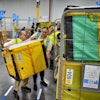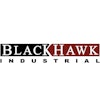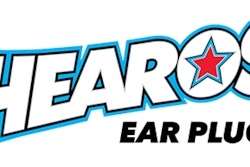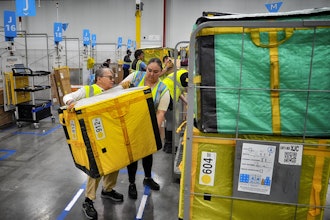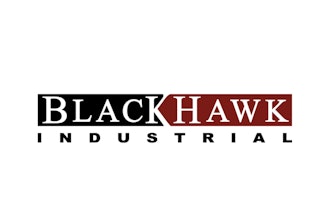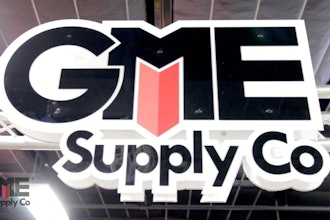The struggling global economy has a ripple effect. Consumer demand is down, so manufacturing has slowed and companies are laying off workers and cutting shifts. The destructive ripple moves to distributors which supply those manufacturers. Orders are down, revenues are down, and many distributors assume there’s nothing they can do but wait until
the economy picks up.
In effect, some distributors fall back and try
to re-group. They go on the defensive. They slash inventory and jobs. In many cases, bank and credit lines have been sharply reduced.
Those moves in turn degrade service levels, which ripples back to their customers in the form of longer lead times, late orders and overall a degradation
in the relationship between distributor and
its customers.
Distributors gain market share by going on the offensive – even in challenging economic times
Point-Of-Work Technologies
Strong Competitors Target Weaker Industrial Distributers,
Plan Strategic Attacks on Key Accounts
“If everybody is thinking alike, then somebody isn’t thinking.”
Figure1 below illustrates customer relationships are negatively affected when Industrial Distributors become overly defensive. Often distributors’ actions that are intended to reduce risk have the reverse effect. Risk is actually increased by defensive tactics.
As distributors get more desperate, they resort
to desperate tactics. The most common of these
is cutting prices to win business. This only masks
the problem temporarily. Revenue without profit
is a worse fate than no revenue at all. It’s a recipe
for failure . . . and one which distributors don’t have to follow.
(Figure 1)
Defensive Actions
(Inaction)
-Personnel Cuts
-Reduced Inventory Levels
-OEM/ Supplier
Relationships Impaired
-Price Cutting
Degradation of
Service Levels
-Slower Response
-Order Fulfillment Delays
-Stockouts
-Order/ Billing Errors
Increase
-Accounts Payable Drag
Deteriorating
Customer
Relationships
-Supplier Response
Negatively affects
Customer Performance
-Customer/ Supllier
Relationship Becomes
Vulnerable
Industrial distributors can turn the current economy and shrinking market into a very large and very real opportunity.
Aggressive distributors will seize this opportunity to increase sales. Distributors large and small alike have put Apex Supply Chain Technologies’ vending systems to work for them to both retain and build business.
Less equals more – $100,000 more
St. Lawrence Industrial & Safety Supply
is a distributor of industrial mixed gases, torches
and welders, electrical equipment and safety
products and accessories including Air Liquide, DeWalt, RIDGID, Flex-O-Vit, ESAB and Dormer.
The company is based in Cornwall, Ontario, Canada, about 60 miles from Montreal, Quebec.
A manufacturer of fluorescent light fixtures
employing about 250 people was a St. Lawrence
customer, steadily purchasing a large volume
of cut-resistant gloves. But little else.
St. Lawrence’s Pierre Bissonnette, who has
assisted the customer with material problems
in the past, recognised that customer had a major problem with tools and safety supplies – and that customer didn’t even realize the scope of the
problem.
“They were running out of material and
products, and tracking of products was a problem,”
said Bissonnette.
He contacted Apex Supply Chain Technologies and learned the benefits of Apex’s Connect n’ Go™ technology and Trajectory™ enterprise technology platform software. Pierre knew his customer
needed control and to introduce accountability
and that they needed real-time visibility to usage patterns, stock levels, and re-ordering requirements. Apex addressed all three.
Soon, St. Lawrence installed an Apex Edge
5000 industrial vending machine at the customer’s
point-of-work. The system includes Apex-hosted Trajectory software which manages usage,
inventory, and replenishment.
It showed immediate results. The customer
quickly discovered that it was no longer running
out of cut-resistant gloves – usage was being tracked and they had automatic reports about
which employees were using gloves and how often.
As a result, they needed fewer cut-resistant gloves, which saved them money.
But didn’t that translate to lost business
for St. Lawrence Industrial & Safety Supply?
No. By demonstrating the effectiveness
of industrial vending – and saving the customer
thousands of dollars a month – Bissonnette built
a stronger relationship with his customer. So instead of just buying cut-resistant gloves, that company now also buys from St. Lawrence:
- respiratory equipment
- power bits
- safety glasses
- cut-resistant arm bands
- ear plugs
- utility knives
- many more products
The net result?
Easily an additional $100,000 a year in business,
Bissonnette said. “The people at Apex have been very helpful,” he said. “The system works like a charm.”
Recognizing opportunity and seizing it
Haggard & Stocking is the largest privately-held
distributor in the U.S. state of Indiana, with 6
locations in 5 states – 2 in Indiana and 1 each in
Texas, Florida, Georgia and North Carolina. They supply approximately 20,000 MROP products to
the aerospace, automotive, foundry, transportation, machine tool, and fabrication markets.
Their primary product focus is on perishable tooling, material handling, safety and related MROP products and they are also heavily involved in integrated
supply and vendor-managed inventory programs.
A valued Haggard & Stocking customer –
a manufacturer of automobile equipment –
recognized the efficiency and value of point-of-work industrial vending. But a competitor of Haggard & Stocking installed a machine in the manufacturing plant to dispense caps, inserts, round tools, and drills.
That took business away from Haggard
& Stocking, as their competitor was selling all
of the material dispensed by the machine. But Haggard & Stocking Sales Manager Jeff Haggard recognized this as an opportunity. “We had to get creative,” he said.He had recently researched
industrial vending and Apex Supply Chain
Technologies’ systems. He saw advantages in
Apex’s easy-to-work Connect n’ Go technology and software. Also, the cost of an Apex system provided much more value than what the manufacturer was currently using, both in initial set-up and over the long-term. The customer agreed to have Haggard & Stocking install and supply an Apex machine. The result? Not only about $5,000 in additional business per month from that customer, but the potential to gain even more business in the future for other items. Apex’s industrial vending system “has locked us into more business,” Haggard said. Haggard & Stocking didn’t accept that a significant chunk of their business was gone forever. By utilising Apex Supply Chain Technologies’ vending solutions, they actually added business, strengthened their relationship with the customer, and gained more market share from that customer than they previously had. And the
software and tech support from Apex has been “pain-free,” Haggard said.
Building relationships – and sales
C&T Industrial Supply in Mercersburg, Pennsylvania USA has a customer with no control of the distribution and tracking of cutting tools to its employees.
By providing an industrial vending system from Apex Supply Chain Technologies, C&T solved their customer’s problem and also solidified their relationship with a valued customer.“ C&T buys the systems and provides them to the customers to use. There’s no monthly cost or fees to them. We pay those,” said Vice President and General Manager Rick Twine. “Our customer doesn’t even have to ‘carry’ the inventory.” C&T owns the machines and restocks them.
“In every situation, in the beginning we’re only supplying certain items to the customer. But over time we capture more and more business in abrasives, cutting tools, welding supplies, cutting fluids and more.”
This popular concept is referred to as a
“bundled offer”— the supplier “bundles” the
cost of technology and services together with his
product offering. The customer signs an “informal 3-year contract” and commits to a minimum monthly dollar figure of purchases. Customers also give C&T first crack at other materials and supplies they
normally purchase, and C&T even receives
automatic re-orders.
Everyone wins in a “bundled” arrangement.
The end-user customer gets the benefit of the
latest industrial vending technology and automated
restocking services and the supplier gets
additional business and achieves lower operating costs (by eliminating emergency orders and
automating the flow of replenishment orders).
“In every situation, in the beginning we’re only
supplying certain items to the customer,” Twine
said. “But over time we capture more and more business in abrasives, cutting tools, welding supplies, cutting fluids and more.”
One customer with 110 employees has two
machines that generate up to $40,000 a month
in sales and another with 130 employees has five
machines that generate up to $30,000 per month.
“I can tell you this: Installing (Apex) machines
solidifies our presence within a facility and increases our sales within that facility” every time, Twine said.
From a little to a lot
Vending is a lead-in to additional cutting-tool
business as well as additional volume, according to Jim Long, president of Cline Tool and Service Company in Newton, Iowa USA. “We’ve gone into accounts where we had very little existing business; now we have it all,” he said. Although Cline Tool’s specialty is cutting tools and inserts, vending has given them the opportunity not only to increase cutting tool sales with an existing customer, but gain additional business. “In one plant, we had about 30% of their cutting-tool business,” Long said.
“Their shop foreman tightly-controlled things and everything went through him. You had to go to his office and get supplies from him. He was very concerned about vending when they looked into it. “And we’ve gained an additional $15,000 per month in revenue from them, mostly cutting tools,” he said.
Smart way to gain business
Fastenal, with over 2,700 store and in-plant
locations, has combined Apex Supply Chain
Technologies’ Connect n’ Go technology and
incorporated it into their FAST Solutions program, in which FAST provides technology and stocking services. Backed by aggressive sales and marketing campaigns, the FAST Solutions program is driving significant business growth and new account acquisition at a time when the total MRO marketplace
is shrinking. Fastenal has gained business through showing customers how to be more efficient, thereby strengthening ties with customers and increasing overall sales. Fastenal and Apex technology has proved superior to the systems previously utilized by existing vending customers. “In some plants we had the tool business,” said Fastenal’s DJ Schilling. “Vending has helped us pick up the PPE volume, since we’re already there and doing the work.”
Bundling Brings Business
Historically, there has been a good bit of resistance to industrial vending from industrial distributors. It was not clear how the technology should be marketed. The business model was confusing and customer demand was modest. So, many industrial distributors either offered industrial vending programs as a “last resort” when pushed by their customers or ignored industrial vending altogether.
Apex Connect n’ Go technology provides the
latest and best industrial vending technology at much lower prices than historical industry price levels. This makes the business case easy to justify (and easy for customers to say “yes”). Connect n’ Go technology makes it easier to implement, which frees up time and resources for the industrial supplier and is easier to use, which increases customer satisfaction.
Customer demand for Point-Of-Work vending
solutions is at an all-time high. In the current
economic environment, companies are actively
pursuing any and all possible means of reducing costs and improving productivity.
Leasing has also contributed the switch to
Point-Of-Work technology, and accelerated growth as well. The low monthly lease cost of Apex Connect n’ Go technology makes it easy for distributors to bundle the technology into their offers without
tapping into their capital or existing credit lines.
Leasing Apex POW also allows customers to enjoy the benefits of Apex POW technology without
making a capital expenditure.
Bundling strengthens the ties between supplier and customer, and can bring in increased business even during tough economic times. The customer still needs to buy a certain amount of supplies even if business has slowed, but as a result of bundling, the supplier has gained a larger share of the customer’s business.
In one case, a particular customer historically
purchased only personal protection equipment
from a distributor.
But even though the customer is experiencing
a downturn in business, due to the bundling
arrangement, that customer also now buys its
cutting inserts and abrasives from that distributor.
So the distributor has actually gained business, while the customer benefits by increasing its efficiency
of dispensing tools, supplies and materials.
Strengthening Customer Relationships, Lowering Distributors’ Operating Costs
Many suppliers have been reluctant to embrace
the idea of providing Point-of-Work machines at
“no cost” to customers. This violates the “traditional” business model, and until fairly recently the machines were cost-prohibitive for suppliers.
However, that has all changed. New low price levels made possible by Apex Connect n’ Go technology, combined with rapidly increasing customer demand for POW technology means suppliers are now seeing both the economic and the competitive advantage in bundled offers.
Bundling services with POW technology not only adds profitable customers, it strengthens the existing relationship between distributor and customer
in more ways than one. Suppliers are learning that they can lessen the chance of a competitor taking their business, because their customers come
to depend on the POW technology they are being provided.
Apex POW technology provides control and
real-time information availability. This enables much faster inventory turn rates than have previously been possible. Often inventory in well-managed industrial vending machines turns as often as 15-30 times per
year. Particularly in the case of high-work cutting tools, inventory turns can be accelerated to a point where inventory is turning every 3-5 days.
So it now can be an advantage rather than
a disadvantage to offer consignment inventory
as a standard option in bundled service offers.
Bundling offers several advantages to a supplier,
especially in today’s economic climate:
- It insulates existing customers from being taken
away by the competition
- Those existing customers will often give the supplier
business that previously went to other suppliers, as
in the aforementioned example.
- It lowers the suppliers cost to serve the customer—
no stockouts, no emergency orders, no slow-
moving inventory
Apex’s Industrial Vending Systems help suppliers to lower their “back end” order processing, inventory and fulfillment costs. Figure 2. below illustrates how Industrial Distributors can reduce their operating expenses while improving customer satisfaction at the same time. This strengthens the distributors’ competitive position and improves profit margins.
Automated Point-of-Work Systems Help Industrial
Distributors To Achieve
Lower “Back-end”
Costs While imporoving
Customer Experience
St. Lawrence’s Pierre Bissonnette, who has assisted the customer with material problems in the past, recognized that customer had a major problem with tools and safety supplies – and that customer didn’t even realize the scope of the problem.
Finally, bundling is a great way to grow a distributor’s business. Industrial vending can be a way to get your foot in the door with many companies that haven’t previously given strong consideration to a particular supplier.
Combining all that with an increase in the number
of competitors making the shift, a distributor of
industrial supplies cannot afford to ignore this
opportunity any longer.
How to bundle up more business
There are three types of bundled offers being
used by suppliers:
- Bundled with Integrated Supply Program
- Bundled Offer With Supplies
- Bundled Offer With Supplies and Services
In a Bundled with Integrated Supply Program, many integrated suppliers now include
POW technology as part of their contracts for
outsourcing MRO procurement and distribution.
Often the end-user requires POW technology as
part of the Statement of Work.
As with most Integrated supply engagements,
once the integrator is appointed, the integrator
becomes the procurer of the POW technology on the end-worker’s behalf. By automating repetitive, manual tool crib transactions and moving them out to the Point-Of-work, Integrated Suppliers can improve the level of service to their customers while decreasing their cost to provide those services.
In a Bundled Offer With Supplies structure,
a supplier of consumables offers the POW technology as part of the supply program. There are numerous derivations of this structure ranging from simple to complex. The simplest of these is when a supplier offers to provide a machine as part of an agreement to provide supplies.
•
Automate Reordering
•
Eliminate Stockouts
•
Reduce Inventory
•
Improve Inventory Levels
•
Eliminate Emergency Orders
•
Eliminate Expedite Costs
- A cost may or may not be assigned to the machine.
- A monthly payment may or may not be assigned to
the machine.
- A minimum purchase amount is typically required on
a monthly or annual basis.
- In some cases, the machine is provided at no charge if the supply purchase obligations are met. This is often referred to as the “Free Machine” program. In other cases, a rebate or credit is established based on purchase volumes to offset the imputed monthly cost for the machine. The “Free Machine” is a successful means of gaining profitable market share.
- Many suppliers are now driving an important change
in offer structures. The “Free Machine” offer is
shifting to “Free Use of a Machine” (and away from
“We Will ‘Give’ You a Free Machine”. This allows
the supplier to:
•
Retain more control over the end user
•
Tie use of the machine closely to product purchases, year after year
•
Tie customers more closely to the supplier
•
Increase the barrier to change
•
Build a large pool of strategic assets
•
deployed at customer accounts
In some variations of this structure, suppliers
“buy down” the monthly payment for their
customers by offering a partial subsidy.
This approach is frequently used for low-volume
customers. For example, for a POW system with
a standard monthly payment of $250 per month,
a vendor might offer a $125 per month subsidy,
thus buying down the cost by half.
A Bundled Offer With Supplies
and Services Structure
This structure is very much like Bundled Offer With
Supplies, except that the supplier may offer
additional services such as repackaging of
vendible products and refilling machines.
apexsupplychain.com
Distributors gain market share by going on the offensive – even in challenging economic times
Latest in Home
ABB to Invest $110 Million in 4 U.S. Plants
September 17, 2025
BlackHawk Adds McNutt as Northeast Region GM
September 16, 2025

